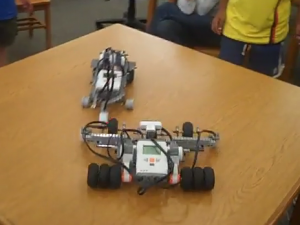
Khan Academy
In just the past couple of years, Salman Khan has built a huge following for the Khan Academy. He's created more than 2,700 educational videos that have been viewed tens of millions of times over. He’s been on CNN, NBC Nightly News, PBS News Hour, and other major media. His videos are being incorporated into school curricula across the country.
But the videos are just the beginning. Using part of a $5 million grant from the O'Sullivan Foundation, Khan is planning the next iteration of the Khan Academy, which will soon find its place in the physical world. This summer, he will run a camp for kids very similar to the program he co-organized at the We Teach Science camp in Silicon Valley two years ago.
Far from just watching videos, kids at the We Teach Science camp got their hands on a slew of math, science, and engineering projects. They organized a Sumo wrestling match between Lego robots they’d built using Lego NXT kits. “Whichever robot falls off loses. If no robots fall off, it’s a draw after three minutes,” Khan said.
They played a “paranoia” version of the game Risk to understand the theory of probabilities using Monopoly money, where kids trade securities based on the outcome of the game. “Some of the kids couldn’t see the board, which is indicative of what a lot of traders are doing right now,” Khan said.
They orchestrated a crowd-sourcing project to test the wisdom of the crowds by posting a one-day online photo contest that drew more than 1,000 participants. The kids put together a pile of objects, took a picture of it, posted it on Mechanical Turk, and asked players to guess the measurements. What happened? “The people who guessed online did better than any of our experts,” he said. "We didn’t know how it would turn out because it was totally open-ended. We had a fun discussion about wisdom of the crowds, when it works, when it doesn’t work, why does it works."

